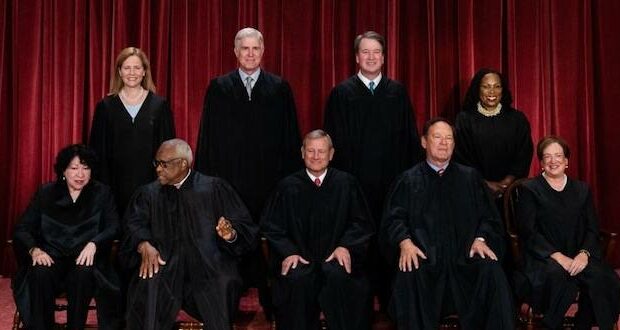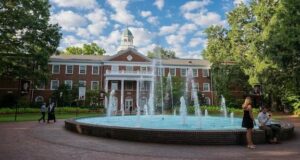The Supreme Court today could hand down five important decisions as part of 18 cases heard this term. Just two weeks remain before the summer recess.
This week’s decisions will come today and Friday. Previously, the court had needed to extend its term into July but finished June 30 in 2022.
Here are several cases awaiting a ruling from the nation’s Highest Court:
Student loans: Biden v. Nebraska and Dept. of Education v. Myra Brown
Six Republican-led states — Missouri, Nebraska, Iowa, Arkansas, Kansas, and South Carolina — have asked the justices to block the Biden administration’s student loan forgiveness program. The states argue President Joe Biden exceeded his legal authority when he implemented the program last August to cancel up to $20,000 in debt for people holding federal student loans.
A second legal challenge disputing the forgiveness plan surrounds two borrowers who say they were deprived of their “procedural rights” by the Biden administration because the White House didn’t allow the public to weigh in on the scope of its student loan forgiveness plan. Their lawyers contend the two borrowers are either partially or fully excluded from relief.
The case, argued in February, asks whether the law known as the HEROES Act gives the secretary of education the power to grant federal student loan forgiveness.
The Supreme Court’s 6-3 Republican-appointed majority seemed skeptical that the Biden administration had the authority to forgive hundreds of billions of dollars in debt for more than 40 million borrowers. Conversely, they also appeared leery about whether the individual borrowers or the state plaintiffs had the standing to bring the lawsuits.
Affirmative action: Students for Fair Admissions v. Harvard and Students for Fair Admissions v. University of North Carolina
Among the decisions in front of the Supreme Court is the question of affirmative action, which describes the practice of colleges using race in admissions policies to increase diversity on their campuses. However, that practice has been brought under scrutiny by conservatives who argue such policies violate the Constitution.
The two cases against Harvard University and the University of North Carolina coincide. While UNC is a state school, the question is whether its affirmative action program violates the 14th Amendment’s guarantee to equal protection of the law. Although Harvard is private, it is still covered by federal anti-discrimination laws because it receives federal funding for a wide array of programs.
During October’s oral arguments, the majority on the high court appeared leery of maintaining the practice of affirmative action.
Sunday shifts at USPS: Groff v. DeJoy
The lawsuit between a former U.S. Postal Service mail carrier and his former employers tests how far a business must go to accommodate the religious views of employees.
In 1977, the Supreme Court ruled that an employer need not accommodate an employee’s desire to avoid working on the Sabbath if that would mean operating shorthanded or requiring doling out premium wages to replace the workers. The justices at the time said an employer should not have to bear a so-called “de minimis,” or trifling burden.
The dispute arose as Congress has repeatedly failed to fulfill proposals to provide greater accommodation for religious observers in the workplace.
The case, Groff v. DeJoy, was argued in April and brought by former postal worker Gerald Groff, whose USPS managers arranged for other workers to deliver packages on Sundays until July 2018, when he began to face disciplinary actions if he did not come to work.
LGBT and religious rights: 303 Creative v. Elenis
The lawsuit brought against Colorado’s anti-discrimination law stems from a religious business owner who sees herself as an artist who does not want to use her creative talents to express a message she doesn’t believe in.
Plaintiff Lorie Smith argues the state’s public accommodations law bars her from doing what she wants to do more than anything else — create custom websites for heterosexual couples. During December’s oral arguments, her counsel argued that Smith’s Christian faith prevents her from doing work for same-sex marriages and says her business has been stifled from getting off the ground over the concern that she may face litigation if she denies same-sex clients.
North Carolina GOP seeking limits on state court review: Moore v. Harper
The case brought by North Carolina Republican lawmakers, argued in December, is a dispute over the state Supreme Court’s dismissal of a GOP-backed apportionment plan for being too partisan.
Republicans challenged the high court, but conservative justices regained control. The now-5-2 Republican-majority court will rehear the redistricting case, reversing its prior ruling that influenced the pending Moore v. Harper case before the Supreme Court.
Legal experts speculate whether the Supreme Court will still offer guidance on the so-called “independent state legislature theory.” This theory asserts broad discretion for state legislatures in administering federal elections, with minimal oversight from state courts or governors. The court’s stance on this matter remains uncertain.
–Washington Examiner News Services. Used with permission.
 Metro Voice News Celebrating Faith, Family & Community
Metro Voice News Celebrating Faith, Family & Community 







